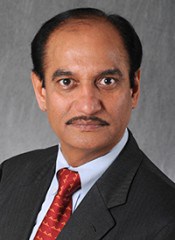
A researcher whose work has been subject to three retractions and two expressions of concern has settled a lawsuit he filed against his university for breach of contract and emotional distress.
Rakesh Kumar had sued George Washington University for $8 million, claiming that his employer had relieved him of department chair duties without following the correct procedure, following a finding of misconduct in his lab. He also claimed that the university had either leaked confidential information about an investigation into his work, or at least failed to keep that information from being posted in a comment here on Retraction Watch.
Last year, the university filed a motion to dismiss the case, but in March, a judge allowed some of it to go forward. On Thursday, the parties settled the case.
We asked Kumar’s attorney, Paul Thaler, to describe the terms of the settlement and say whether Kumar would remain employed at George Washington:
Dr. Rakesh Kumar and George Washington University wished to resolve and settle all of their differences to avoid the delay, expense and uncertainty associated with administrative proceedings and litigation. Accordingly, they have reached mutually agreeable terms to settle all disputes between them. Those terms are confidential.
Barbara “Biz” Van Gelder, an attorney for the university, also said she could not comment on the settlement.
Thaler, who in a July post explained why he represents scientists accused of misconduct, had earlier described the university’s investigation and report as “sub-standard.” Callan Stein, another attorney who represents scientists in similar cases but who was not involved in this case, noted in April that the court’s decision in March to reject some portions of the suit may create a precedent for private universities to have the kind of immunity from lawsuits related to misconduct that the government has in some cases.
In addition to three retractions and two expressions of concern, Kumar has had five papers corrected.
Like Retraction Watch? Consider making a tax-deductible contribution to support our growth. You can also follow us on Twitter, like us on Facebook, add us to your RSS reader, sign up on our homepage for an email every time there’s a new post, or subscribe to our new daily digest. Click here to review our Comments Policy. For a sneak peek at what we’re working on, click here.
I believe your count may be slightly low. By my records…
3 Retractions:
PMID 22203674 (JBC 2012)
PMID 15226262 (Development 2004)
PMID 17505058 (Mol Endocrinol 2007)**
2 EoCs:
PMID 20022949 (JBC 2010)
PMID 20519513 (JBC 2010)
8 Corrections:
PMID 11208715 (Gastroenterol 2001)
PMID 12611881 (JBC 2003)
PMID 15193260 (Cancer Cell 2004)
PMID 15983119 (J Histo Cytochem 2005)
PMID 15831477 (Mol Cell Biol 2005)
PMID 16617102 (PNAS 2006)
PMID 17671172 (Cancer Res 2007)
PMID 17671180 (Cancer Res 2007)
*The Mol Endocrinol 2007 paper was corrected first, then retracted, so technically speaking that makes 9 corrections.
Also worth noting that, according to the PDF you link to above, it ain’t over quite yet… “Because the settlement agreement contains a brief revocation period (to comply with certain statutory obligations), the settlement will not become immediately effective. If the agreement is not revoked, Plaintiff will file a Stipulation of Dismissal with prejudice no later than August 9, 2016.”
This is a very unsatisfactory outcome. University R+D should be open and transparent. Also when errors are found, the institution should take the responsibility to be open. At least the alleged misconduct in the execution of R+D at GWU should be made clear to the outside world.
More transparency during these cases is highly important. Prestige seems to be more important than to stop and avoid misconduct at US universities.
https://selectbiosciences.com/conferences/biographies.aspx?speaker=1567229&conf=ddi2017&se=india Check this out…